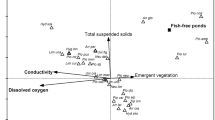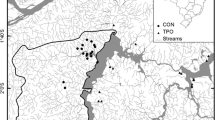Abstract
In some European regions, ponds are the dominant freshwater habitat type. The ecological value of ponds is decreasing owing to human activities, including intensive fish farming involving predation pressure from fish, reduction of macrophytic vegetation, high nutrient loads, and turbidity. Studies have shown the negative effects of high fish stocks on the diversity of macroinvertebrates. Nevertheless, the effect of fish predation on invertebrate communities could be strongly influenced by other factors, such as the structural complexity of aquatic vegetation. Consequently, we aimed to analyze the effects of environmental-trait interactions on the responses of amphibians, odonates, aquatic true bugs, and diving beetles that are directly or indirectly related to pond management. Each monitored group reflected very different variables. Odonates were sensitive to variables reflecting the quality of the aquatic environment and the overall landscape structure, and accurately reflected differences in the management intensity of ponds. Amphibians reflected only the landscape structure, while diving beetles reflected the quality of the aquatic environment. The aquatic Heteroptera community structure was very indifferent to the management and habitat quality. With the exception of oviposition strategies, we were unable to identify functional traits that could present adaptive advantages or disadvantages in relation to management intensity. We deduced that fish farming management is a selective mechanism that operates with an enormously high intensity which fundamentally homogenizes the structure of assemblages and therefore there is no morphological or phenological variability among species. It is therefore difficult to implement appropriate management measures that would benefit species across taxonomic groups. The key is to maintain the variability of the ponds and surrounding landscape mosaic. Moreover, farm ponds are secondary habitats whose role in supporting biodiversity may be important but cannot be seen as an equal alternative to natural wetlands.




Similar content being viewed by others
Data availability
All data supporting the results reported in this paper are accessed as supplementary files.
References
Bartoń K (2009) MuMIn: Multi-Model Inference. R Package Version 0.12.2/r18. http://R-Forge.R-project.org/projects/mumin/
Bendell BE, McNicol DK (1995) Lake acidity, fish predation, and the distribution and abundance of some littoral insects. Hydrobiology 3022 302:133–145. https://doi.org/10.1007/BF00027038
Binckley CA, Resetarits WJ Jr (2003) Functional equivalence of non-lethal effects: generalized fish avoidance determines distribution of gray treefrog, Hyla chrysoscelis, larvae. Oikos 102:623–629. https://doi.org/10.1034/j.1600-0706.2003.12483.x
Briggs AJ, Pryke JS, Samways MJ, Conlong DE (2019) Complementarity among dragonflies across a pondscape in a rural landscape mosaic. Insect Conserv Divers 12:241–250. https://doi.org/10.1111/icad.12339
Céréghino R, Biggs J, Oertli B, Declerck S (2008) The ecology of european ponds: defining the characteristics of a neglected freshwater habitat. Hydrobiologia 597:1–6. https://doi.org/10.1007/s10750-007-9225-8
Céréghino R, Boix D, Cauchie HM et al (2014) The ecological role of ponds in a changing world. Hydrobiologia 723:1–6. https://doi.org/10.1007/s10750-013-1719-y
Chester ET, Robson BJ (2013) Anthropogenic refuges for freshwater biodiversity: their ecological characteristics and management. Biol Conserv 166:64–75. https://doi.org/10.1016/j.biocon.2013.06.016
Davies BR, Biggs J, Williams PJ et al (2007) A comparison of the catchment sizes of rivers, streams, ponds, ditches and lakes: implications for protecting aquatic biodiversity in an agricultural landscape. Hydrobiologia 597:7–17. https://doi.org/10.1007/s10750-007-9227-6
Dudgeon D, Arthington AH, Gessner MO et al (2006) Freshwater biodiversity: importance, threats, status and conservation challenges. Biol Rev Camb Philos Soc 81:163–182. https://doi.org/10.1017/S1464793105006950
Eby LA, Roach WJ, Crowder LB, Stanford JA (2006) Effects of stocking-up freshwater food webs. Trends Ecol Evol 21:576–584. https://doi.org/10.1016/j.tree.2006.06.016
ESRI (2011) ArcGIS Desktop: Release 10.7
Foote LA, Rice Hornung CL (2005) Odonates as biological indicators of grazing effects on canadian prairie wetlands. Ecol Entomol 30:273–283. https://doi.org/10.1111/j.0307-6946.2005.00701.x
Francová K, Šumberová K, Kučerová A et al (2019) Macrophyte assemblages in fishponds under different fish farming management. Aquat Bot 159:103131. https://doi.org/10.1016/j.aquabot.2019.103131
Goertzen D, Suhling F (2019) Urbanization versus other land use: diverging effects on dragonfly communities in Germany. Divers Distrib 25:38–47. https://doi.org/10.1111/ddi.12820
Guerry AD, Hunter ML (2002) Amphibian distributions in a landscape of forests and agriculture: an examination of landscape composition and configuration. Conserv Biol 16:745–754. https://doi.org/10.1046/J.1523-1739.2002.00557.X
Harabis F (2017) Does the management of surrounding terrestrial habitats increase the tendency of odonates to leave aquatic habitats? Biodivers Conserv 26:2155–2167. https://doi.org/10.1007/s10531-017-1350-8
Harabiš F (2017) Does the management of surrounding terrestrial habitats increase the tendency of odonates to leave aquatic habitats? Biodivers Conserv 26:2155–2167. https://doi.org/10.1007/s10531-017-1350-8
Hartel T, Szilá AE, Ae N et al (2007) The effect of fish and aquatic habitat complexity on amphibians. Hydrobiologia 583:173–182. https://doi.org/10.1007/s10750-006-0490-8
Havel JE, Kovalenko KE, Thomaz SM et al (2015) Aquatic invasive species: challenges for the future. Hydrobiologia 750:147–170. https://doi.org/10.1007/s10750-014-2166-0
Hill MJ, Sayer CD, Wood PJ (2016) When is the best time to sample aquatic macroinvertebrates in ponds for biodiversity assessment? Environ Monit Assess. https://doi.org/10.1007/s10661-016-5178-6
Hill MJ, Heino J, Thornhill I et al (2017) Effects of dispersal mode on the environmental and spatial correlates of nestedness and species turnover in pond communities. Oikos 126:1575–1585. https://doi.org/10.1111/oik.04266
Houlahan JE, Findlay CS (2011) The effects of adjacent land use on wetland amphibian species richness and community composition. 60:1078–1094. https://doi.org/10.1139/F03-095. https://doi.org/101139/f03-095
Jäch MA, Balke M (2017) Global diversity of water beetles (Coleoptera) in freshwater. Hydrobiologia 595:419–442. https://doi.org/10.1007/s10750-007-9117-y
Janssen A, Hunger H, Konold W et al (2018) Simple pond restoration measures increase dragonfly (Insecta: Odonata) diversity. Biodivers Conserv 27:2311–2328. https://doi.org/10.1007/s10531-018-1539-5
Kloskowski J, Nieoczym M (2015) Management practices to enhance wildlife diversity of man-made fish ponds: the importance of the hydroperiod. Knowl Manag Aquat Ecosyst. https://doi.org/10.1051/kmae/2015032
Lemmens P, Mergeay J, Bie T, De et al (2013) How to maximally support local and regional biodiversity in applied conservation? insights from pond management. PLoS ONE 8:e72538. https://doi.org/10.1371/JOURNAL.PONE.0072538
Marsh DM, Cosentino BJ, Jones KS et al (2017) Effects of roads and land use on frog distributions across spatial scales and regions in the Eastern and Central United States. Divers Distrib 23:158–170. https://doi.org/10.1111/DDI.12516
Mikolajewski DJ (2004) Morphological and behavioral defenses in dragonfly larvae: trait compensation and cospecialization. Behav Ecol 15:614–620. https://doi.org/10.1093/beheco/arh061
Nagy HB, László Z, Szabó F et al (2019) Landscape-scale terrestrial factors are also vital in shaping Odonata assemblages of watercourses. Sci Rep 9:1–8. https://doi.org/10.1038/s41598-019-54628-7
Niku J, Warton DI, Hui FKC, Taskinen S (2017) Generalized linear latent variable models for multivariate count and biomass data in ecology. J Agric Biol Environ Stat 22:498–522. https://doi.org/10.1007/S13253-017-0304-7
Niku J, Hui FKC, Taskinen S, Warton DI (2019) gllvm: fast analysis of multivariate abundance data with generalized linear latent variable models in r. Methods Ecol Evol 10:2173–2182. https://doi.org/10.1111/2041-210X.13303
Noble A, Hassall C (2014) Poor ecological quality of urban ponds in northern England: causes and consequences. Urban Ecosyst 18:649–662. https://doi.org/10.1007/s11252-014-0422-8
Nori J, Lemes P, Urbina-Cardona N et al (2015) Amphibian conservation, land-use changes and protected areas: a global overview. Biol Conserv 191:367–374. https://doi.org/10.1016/j.biocon.2015.07.028
Oertli B, Parris KM (2019) Review: toward management of urban ponds for freshwater biodiversity. Ecosphere. https://doi.org/10.1002/ecs2.2810
Pavelková R, Frajer J, Havlíček M et al (2016) Historical ponds of the Czech Republic: an example of the interpretation of historic maps. J Maps 12:551–559. https://doi.org/10.1080/17445647.2016.1203830
Polhemus JT, Polhemus DA (2008) Global diversity of true bugs (Heteroptera; Insecta) in freshwater. Hydrobiologia 595:379–391. https://doi.org/10.1007/s10750-007-9033-1
Raebel EM, Merckx T, Feber RE et al (2011) Identifying high-quality pond habitats for Odonata in lowland England: implications for agri-environment schemes. Insect Conserv Divers no-no. https://doi.org/10.1111/j.1752-4598.2011.00178.x
Raebel EM, Merckx T, Feber RE et al (2012) Multi-scale effects of farmland management on dragonfly and damselfly assemblages of farmland ponds. Agric Ecosyst Environ 161:80–87. https://doi.org/10.1016/j.agee.2012.07.015
Reid AJ, Carlson AK, Creed IF et al (2019) Emerging threats and persistent conservation challenges for freshwater biodiversity. Biol Rev 94:849–873. https://doi.org/10.1111/brv.12480
Resetarits WJ (2001) Colonization under threat of predation: avoidance of fish by an aquatic beetle, Tropisternus lateralis (Coleoptera: Hydrophilidae). Oecologia 129:155–160. https://doi.org/10.1007/s004420100704
Schmidt-Kloiber A, Hering D (2015) Www.freshwaterecology.info - an online tool that unifies, standardises and codifies more than 20,000 european freshwater organisms and their ecological preferences. Ecol Indic 53:271–282. https://doi.org/10.1016/j.ecolind.2015.02.007
Scott RC Jr, Pintar MR, Resetarits WJ Jr et al (2021) Patch size drives colonization by aquatic insects, with minor priority effects of a cohabitant funding information. Ecol Evol. https://doi.org/10.1002/ece3.8313
Shipley B, Vile D, Garnier É, Garnier E (2006) From plant traits to plant communities: a statistical mechanistic approach to biodiversity. Science 314:812–814. https://doi.org/10.1126/science.1131344
Šigutová H, Šigut M, Dolný A (2015) Intensive fish ponds as ecological traps for dragonflies: an imminent threat to the endangered species Sympetrum depressiusculum (Odonata: Libellulidae). J Insect Conserv 19:961–974. https://doi.org/10.1007/s10841-015-9813-2
Simaika JP, Samways MJ (2009) An easy-to-use index of ecological integrity for prioritizing freshwater sites and for assessing habitat quality. Biodivers Conserv 18:1171–1185. https://doi.org/10.1007/s10531-008-9484-3
Smith J, Samways MJ, Taylor S (2006) Assessing riparian quality using two complementary sets of bioindicators. Biodivers Conserv 16:2695–2713. https://doi.org/10.1007/s10531-006-9081-2
Vences M, Köhler J (2008) Global diversity of amphibians (Amphibia) in freshwater. Hydrobiologia 595:569–580. https://doi.org/10.1007/978-1-4020-8259-7
Wellborn G, Skelly DK, Werner EE (1996) Mechanisms creating community structure across a freshwater habitat gradient. Annu Rev Ecol Syst 27:337–363. https://doi.org/10.1146/annurev.ecolsys.27.1.337
Wezel A, Oertli B, Rosset V et al (2014) Biodiversity patterns of nutrient-rich fish ponds and implications for conservation. Limnology 15:213–223. https://doi.org/10.1007/S10201-013-0419-7
Williams P (2004) Comparative biodiversity of rivers, streams, ditches and ponds in an agricultural landscape in Southern England. Biol Conserv 115:329–341. https://doi.org/10.1016/S0006-3207(03)00153-8
Yee DA (2014) Ecology, systematics, and the natural history of predaceous diving beetles (coleoptera Dytiscidae). Ecol Syst Nat Hist Predaceous Diving Beetles (Coleoptera Dytiscidae). https://doi.org/10.1007/978-94-017-9109-0
Acknowledgements
We thank Czech Nature Conservation Agency of the Czech Republic which granted us permission to data sampling. We also thank Martina Valešová, Jiří Hronek and Lucie Dolejšová for their help with the data sampling and two anonymous reviewers for very stimulating comments and suggestions. This work was supported by the Czech Science Foundation (18-24425S).
Author information
Authors and Affiliations
Contributions
FH conceived and designed the analysis, collected the data, contributed data, performed the analysis and wrote the manuscript. JH, TH and HŠ contributed to the data collection and to the writing of the manuscript.
Corresponding author
Ethics declarations
Conflict of interest
The Authors declare that there is no conflict of interest. The study was conducted in compliance with ARRIVE guidelines. Amphibians handling was carried out according to the European Union Directive 2010/63/EU for the protection of animals used for experimental and other scientific purposes, the “Guidelines for the treatment of animals in behavioural research and teaching’. No mortality or stress was observed. We declare that all other manipulations with animals were performed in accordance with relevant guidelines, regulations and ethics.
Additional information
Communicated by Dirk Sven Schmeller.
Publisher’s Note
Springer Nature remains neutral with regard to jurisdictional claims in published maps and institutional affiliations.
Supplementary Information
Below is the link to the electronic supplementary material.
Rights and permissions
Springer Nature or its licensor (e.g. a society or other partner) holds exclusive rights to this article under a publishing agreement with the author(s) or other rightsholder(s); author self-archiving of the accepted manuscript version of this article is solely governed by the terms of such publishing agreement and applicable law.
About this article
Cite this article
Harabiš, F., Hronková, J., Holer, T. et al. Selective effect of fish farming management on freshwater diversity. Biodivers Conserv 32, 735–753 (2023). https://doi.org/10.1007/s10531-022-02521-7
Received:
Revised:
Accepted:
Published:
Issue Date:
DOI: https://doi.org/10.1007/s10531-022-02521-7




